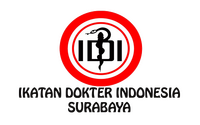Publication Ethics
Surabaya Physical Medicine and Rehabilitation Journal (e-ISSN: 26560895) provides a forum for publishing the original research articles, review articles from contributors, and the novel technology news related to physical medicine and rehabilitation including neuromuscular, musculoskeletal, cardiorespiration, pediatric, geriatric, and sport. This following statement clarifies ethical behavior of all parties involved in the act of publishing an article in this journal, including the authors, the editors and the reviewers. This statement is adopted under COPE's Best Practice Guidelines for Journal Editors.
ETHICAL GUIDELINE FOR JOURNAL PUBLICATION
The publication of an article uses peer-reviewed process in Surabaya Physical Medicine and Rehabilitation Journal. This is a real reflection of the work or the research of the authors and institutions from which they came from. The peer-reviewed article ensures the correct scientific method and maintains Surabaya Physical Medicine and Rehabilitation Journal quality standards. Therefore, it is very important for all parties involved in the Surabaya Physical Medicine and Rehabilitation Journal publications to maintain ethical standards of good worth as writers, editors, peer reviewers, publishers and society in general.
Universitas Airlangga as the publisher of Surabaya Physical Medicine and Rehabilitation Journal carries out its responsibility to maintain the quality standard of publishing an article in every publishing stage seriously and we understand the responsibilities and ethics that must be maintained. We are committed to keeping the Surabaya Physical Medicine and Rehabilitation Journal sponsorship, printing, distribution and commercialization of having no impact or effect on editorial decisions on an article.
USAGE OF ARTIFICIAL INTELLEGENCE
Artificial intelligence (AI) such as ChatGPT and other Large Language Models (LLMs) are not considered authors by Surabaya Physical Medicine and Rehabilitation Journal. The application of LLMs should be stated in the Methods section or another relevant part of the publication. Surabaya Physical Medicine and Rehabilitation Journal does not allow the publication of AI-generated photographs and videos, with the exception of images from contracted agencies or those cited in AI-specific works. It is inappropriate for peer reviewers to evaluate papers using generative AI technologies since the information produced by these tools may be biased and inaccurate. Peer reviewers should openly disclose in their reports if they utilize artificial intelligence (AI) methods in the review process of the manuscripts.
ARTICLE RETRACTION
If there are multiple submissions, fraudulent claims of authorship, plagiarism, false use of data, or other violations of professional ethics, Surabaya Physical Medicine and Rehabilitation Journal may withdraw the paper. Errors in submission or publishing can occasionally be corrected with a retraction. In the world of academia, it is not unusual for a paper to be retracted by its authors or the editor upon the suggestion of other researchers.
PUBLICATION DECISIONS
The editor-in-chief of Surabaya Physical Medicine and Rehabilitation Journal is responsible for determining the manuscripts that have been submitted to be peer reviewed and if the manuscript is meeting the editorial policies and journal's requirement it will be published. Validation of research or literature review and the importance of the manuscript for scientific development, subsequent researchers as well as readers of Surabaya Physical Medicine and Rehabilitation Journal has always been a major consideration in decision making. Editors of Surabaya Physical Medicine and Rehabilitation Journal may refer to the Board of Editors directives and always refer to the rules and regulations that exist in the Republic of Indonesia regarding copyright and plagiarism. Chairman of the board of editors may authorize other members of the editor for decision-making by observing the peer review results.
DUTIES OF EDITORS:
Fair Play
The editor will always uphold the sense of fairness and fairness at all times in evaluating the manuscript regardless of race, sex, sexual orientation, religion and belief, ethics, citizenship or political ideology of the author.
Confidentiality
Editors and all editorial staff are not allowed to disclose information about manuscripts that have been signed by Surabaya Physical Medicine and Rehabilitation Journal to anyone other than to the corresponding author, editorial team, reviewers, and publisher.
Review of Manuscripts
Editor must ensure that each manuscript is initially evaluated by the editor for originality. Editors should critically assess the ethical conduct of studies in humans and animals. The editor should organize and use peer review fairly and wisely. Editors should explain their peer review processes in the information for authors and also indicate which parts of the journal are peer reviewed. Editor should use appropriate peer reviewers for papers that are considered for publication by selecting people with sufficient expertise and avoiding those with conflicts of interest.
Publication Decisions
Based on the review report of the editorial board, the editor can accept, reject, or request modifications to the manuscript. Editors have to take responsibility for everything they publish and should have procedures and policies in place to ensure the quality of the material they publish and maintain the integrity of the published record.
Disclosure and Conflicts of Interest
Unpublished material from a manuscript enters Surabaya Physical Medicine and Rehabilitation Journal is not allowed to be used by the editor as their own research without written consent or agreement from the author.
DUTIES OF AUTHORS:
Reporting Standards
The author of an original research article must present the results openly and objectively discuss the significance of the manuscript. The data supporting the writing must be accurately displayed in the manuscript and it must contain sufficiently detailed explanations for other researchers to replicate the research. Report fraud and consciously writing statements that are inconsistent with data are actually part of unethical and unacceptable scientific behavior.
Originality and Plagiarism
The author must ensure that the manuscripts made are original research results and if the authors refer or use the thoughts, the primary literature should be cited. Original wording taken directly from publications by other researchers should appear in quotation marks with the appropriate citations.
Dual Publication (Multiple, Redundant or Concurrent Publication)
The author must avoid publish the same manuscript to more than one journal at the same time. Such behaviors are considered as unethical and unacceptable publications.
Acknowledgment of Sources
The appropriation of all sources of data used in the research and cite publications must be recognized by the author. The author should only cite articles that are influential and relevant to the manuscript he wrote.
Authorship
The authorship should be limited to those who have made significant contributions to the concept, design, implementation or interpretation of written research. Others who contributes significantly can be written as a co-author while those who made less substantial, or purely technical, contributions to the research or to the publication are listed in an acknowledgement section.
Subject of Hazardous Materials, Humans or Animals (Hazards and Human or Animal Subjects)
If the research involves chemicals, humans, animals, and microbes, procedures or equipment that have risk or interventioninherent in their use, the author must clearly write this in the manuscripts.
Disclosure and Conflicts of Interest
All authors should clearly disclose any financial or other substantive conflict of interest that might be supposed to influence the results or interpretation of their manuscripts. All sources of financial support for the project should be disclosed.
Fundamental Errors in Published Work
If the author finds significant errors or inaccuracies in the manuscript published at Surabaya Physical Medicine and Rehabilitation Journal, it is the author's obligation to immediately notify Surabaya Physical Medicine and Rehabilitation Journal editor or publisher and cooperate with the editor to recall or improve the article.
DUTIES OF REVIEWERS:
Confidentiality
Information regarding manuscripts submitted by authors should be kept confidential and be treated as privileged information. They must not be shown to or discussed with others except as authorized by the editor.
Contribution to Editorial Decisions
Peer review assists editors in making editorial decisions and, through editorial communications with authors, may assist authors in improving the manuscripts. Peer review is a heart of scientific endeavor.
Standards of Objectivity
Review of submitted manuscripts must be done objectively and the reviewers should express their views clearly with supporting arguments. The reviewers should be constructive in their reviews and provide feedback that will help the authors to improve their manuscript.
Promptness
The reviewers should respond in a reasonable time-frame. Any invited reviewer who feels unqualified to review the research reported in a manuscript or knows that its prompt review will be impossible should immediately notify the editors and decline the invitation to review so that alternative reviewers can be contacted.
Acknowledgement of Sources
Reviewers should identify relevant published work that has not been cited by the authors. Any statement that is an observation, derivation or argument that has been reported in previous publications should be accompanied by the relevant citation. A reviewer should also notify the editors of any substantial similarity or overlap between the manuscript under consideration and any other manuscript (published or unpublished) of which they have personal knowledge.
Disclosure and Conflicts of Interest
Privileged information or ideas obtained through peer review must be kept confidential and not used for personal advantage. Reviewers should not consider manuscripts in which they have conflicts of interest resulting from competitive, collaborative, or other relationships or connections with any of the authors, companies, or institutions connected to the papers.

























